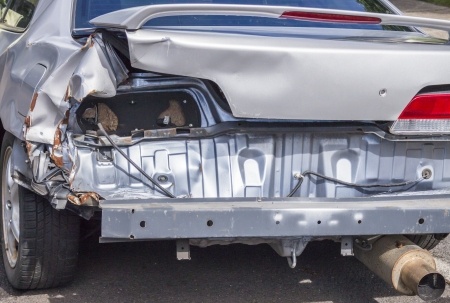Rear-end Collisions - Who may be at fault?
March 19, 2014 | Category: Automobile Accidents | ShareA common type of collision is a rear-end collision. The "assured clear distance ahead rule" states that a driver is to leave enough room in front of his/her vehicle to be able to stop should the vehicle in front make a sudden stop.
"Rear-end collisions are not always the fault of the vehicle at the end of the traffic line," says Fort Myers Accident Attorney, Randall Spivey of Spivey Law Firm, Personal Injury Attorneys, P.A. "These cases may be complex; so it is important to seek legal advice from an experienced attorney."
 In many cases the police and insurance companies will determine the person who rear-ended the vehicle, is at fault. However, the fact of the matter is, there are scenarios where it is not that person's total fault.
In many cases the police and insurance companies will determine the person who rear-ended the vehicle, is at fault. However, the fact of the matter is, there are scenarios where it is not that person's total fault.
Determining who is at fault at the scene of an accident is a matter of figuring out which person was careless, negligent or disobeyed a common traffic law. Drivers can be considered negligent or in violation of a traffic law in a number of ways:
- Failure to pay attention to the road and look out for hazards.
- Failure to stop within a reasonable time.
- Failure to drive at a reasonable speed (based not just on posted speed limits but also on road conditions).
- Failure to maintain control of the vehicle.
- Failure to yield the right of way.
- Failure to use turn signal(s).
- Failure to follow at a safe distance.
In November 2012 the South Florida Sun Sentinel reported on the Florida Supreme Court ruling in a 2005 Palm Beach County accident. According to the Sun Sentinel report, "For more than 50 years in Florida, the second driver in a rear-end collision is automatically presumed negligent, and the ability to wiggle out of fault is steep. Generally, the reasoning goes, the second car should keep enough distance to stop or dodge a wreck." In the court's 7-0 opinion regarding the 2005 Palm Beach County accident, Justice Jorge Labarga wrote that "there was sufficient evidence for a jury to conclude that the rear driver's presumed negligence was not the sole proximate cause of the collision."
A typical scenario of a rear-end accident is when a vehicle is stopped in traffic, either at a red light, on the freeway, stop and go traffic or at a stop sign, and another vehicle crashes into your car from behind. That person who hit the rear end of your car is the one at fault.
It is possible for the driver of the car that gets rear-ended to be considered either fully or partially at fault due to negligence or reckless operation of the vehicle. For instance, a driver reverses suddenly, and the driver stops suddenly to make a turn but doesn’t turn, the front car’s brake lights do not work. What if somebody cuts out in front from a side street, without leaving enough room for you to stop? Or what if somebody merges into your lane immediately in front of you without maintaining sufficient speed? These are two situations that can easily cause a rear-end collision and the rear car, may not generally be held liable.
Although in most rear-end accidents the driver of the rear-ending vehicle will be 100% at fault, in unusual circumstances the result may be quite the opposite, and the driver of the lead vehicle may be found partially or 100% at fault.
Lee County Personal Injury Attorney, Randall L. Spivey is a Board Certified Trial Attorney – the highest recognition for competence bestowed by the Florida Bar and a distinction earned by just one (1%) percent of Florida attorneys. He has handled over 2,000 personal injury and wrongful death cases throughout Florida. For a free and confidential consultation to discuss your legal rights, contact the Spivey Law Firm, Personal Injury Attorneys, P.A., in Lee County at 239.337.7483 or toll free at 1.888.477.4839,or by email to Randall@SpiveyLaw.com. Visit SpiveyLaw.com for more information. You can contact Spivey Law Firm, Personal Injury Attorneys, P.A.in Charlotte County at 941.764.7748 and in Collier County 239.793.7748.

